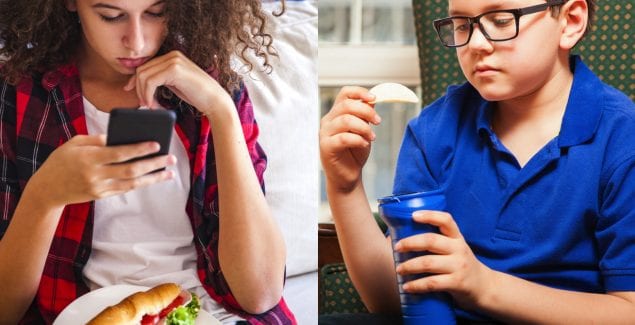What is Emotional Eating?

Posted in: Parenting Concerns
Topics: Healthy Living, Mental Illness + Psychiatric Disorders
Jump To: Tips For Parents
I love watching football.
When I was watching the playoffs this year, it was obvious that some ads were really overrepresented – those promoting comfort food and alcohol (mostly beer). And they’re super compelling. I tend to eat healthy, organic food. But I can tell you, the urge to grab a hamburger, a greasy taco, or some yummy fried chicken tenders is almost irresistible.
Why is this?
In highly emotional situations (like watching sports games or at Super Bowl parties), we eat and drink. That’s a no brainer.
Sometimes eating and drinking are part of social situations. Sometimes they are part of stressful situations.
The fast food and alcohol companies know how capitalize on our stretched and powerful emotions. They tap into our overactive neurocircuitry and draw us to food while we’re jazzed up – perhaps about a football game – and it works. That’s why they pay millions of dollars a minute for these ads.
So, when the game is really exciting or frustrating or infuriating, besides screaming at the TV and scaring my dog who usually sits next to me when I am watching games, I rush to the kitchen for another bowlful of goodies to bring in front of the TV.
This is an example of emotional eating. And fortunately for me, it’s mostly when I am caught up in the frenzy of a ballgame.
But for many others, it’s a real and ongoing problem.
What is Emotional Eating?
Before we get into the problem of emotional eating, we need to understand one basic thing: eating is something we all have to do. It’s not an option. It’s necessary for survival. Our brains are wired to seek nourishment – to prepare for exertion, for stress, for conservation of energy needed at other times. We have an intrinsic drive to eat.
Internal or external forces can tap into this normal biological drive and at times draw upon a basic need, twisting it into problematic behavior.
Emotional Eating is not a bona fide eating disorder. At least, it is not a formal diagnosis in any diagnostic manual. It’s not nearly as well studied as anorexia nervosa, bulimia nervosa, or binge eating disorders. However, many seasoned clinicians and reputable eating disorder programs have observed individuals who have a dysfunctional relationship with food.
Emotional eating may be part of another psychiatric disorder as a way of coping with emotions or stresses in life. It is most often associated with depression, bulimia, binge eating disorder, and a variety of anxiety disorders. It may also be a way to cope with stresses in everyday life.
The importance of paying attention to emotional eating, as parents or as young people, is to prevent this behavior from becoming a habit. It’s the kind of thing that is addictive and repetitive and though the impulse is geared to soothe and calm us, it usually fails. And it can take on a life of its own.
We use food with hopes that it will provide comfort, but paradoxically, it only causes greater stress.
Features of Emotional Eating in Young People
Emotional eating does not arise from hunger, but from an irresistible, urgent feeling or desire to eat. It typically comes on suddenly with the conscious, or unconscious, intent to help calm us down. While normal eating is enjoyable, emotional eating isn’t. it’s almost mechanical and mindless – like eating a bag of chips and not paying attention to emptying the bag. As the commercial says, “Bet you just can’t have one.”
Carbohydrates are often most commonly used, as they are easy to get down. They tend to be satisfying and soothing. Who doesn’t love to scarf down chips, or cupcakes, or donuts, or cookies?
But while the immediate “cause” of emotional eating is some form of stress – including depression or anxiety – it is not relieved after eating. And worse, it’s often compounded by shame and regret of having over-eaten. It’s not satisfying at all. In the effort to feel better, we feel worse.
Tips for Parents
- Be good role models and watch how you use food in front of your child. Too many of us as parents are emotional eaters, ourselves, and naturally our kids are watching.
- Practice good eating habits at home. Food is essential for healthy life. Positive eating habits include:
- Eat healthful foods. On a typical day, reach for a bag of carrots instead of potato chips.
- Eat slowly with small bites.
- Enjoy the food you are eating, noting its flavor, texture, color. Use your senses for full eating enjoyment. You can’t really taste the food when you shovel it into your mouth.
- Eat when you are hungry, not because you “need or want to.”
- Keep portion sizes reasonable.
- Avoid unnecessary snacks.
- Shop for food with your kids. Including children and teens in food shopping choices promotes learning about healthful food selection, as well as autonomy.
- Make eating a part of a social interaction through cooking and eating together. Cooking together fosters appreciation of what goes into making a meal, and it draws upon creativity. And we eat because we need nourishment, and nourishment comes from both the food itself and the interaction we have as family and friends. These practices teach children that food choices, preparation and eating are part of a healthy normal lifestyle, and not a means of coping.
- Try not to use food as a major reward. Sure, if your kid is good, a treat may be fine. But when food becomes the standard reward, it carries an association we do not want to foster.
- Try to avoid associating food and eating with body image. Too often we obsess about the calories, the carbs, or the fat, and how it is going to affect how our body looks. Food should not be associated with how we look.
- If your child is tired and reaches for food, suggest alternatives:
- Can you wait before reaching for the chips?
- Help your child identify emotional triggers before reaching for food, and suggest other ways of coping. Awareness and mindfulness about triggers is really important. Once awareness occurs, try some other coping skills instead of eating.
- Ask your child, “what are you feeling right now?” Then before the eating begins, have a conversation about current emotions and what triggered them. By the time the conversation is done, eating may not be such a strong impulse. And in the conversation, suggest doing some activity together, like taking a walk or drawing as substitute for eating.
- Promote other coping skills:
- Talk with your kids about life’s stresses and how you and others cope. Give them suggestions.
- If your child is depressed or anxious, try some cognitive therapy techniques to help them change the way they are thinking. This can be done together, initially, and eventually a child can do it on their own.
- Meditation is an effective means of stress reduction and mood regulation
- Get moving! Take a walk, ride a bike.
- Artistic expression is often a stress reliever. Draw, dance, play music.
- Writing in journals is often a great release.
- Reading or playing games with your child may help.
The bottom line is to distract the child from food, and substitute other means of coping until the urge to eat passes.
Working with Older Kids
Adolescents and young adults may have a tougher time managing emotional eating. They have greater autonomy, and too often are led to the corner store, calling for takeout, or driving with friends to the local pizza place.
A complicating problem for many teens today is that with increased mobility and cash, there’s greater access to a wide range of food sources – and unfortunately, fast food is incredibly tempting, readily available and cheap.
At the same time, teens are increasingly aware of healthy foods along with their production and preparation. As parents, we can have conversations with our teens and young adults about when and how we eat, how food is used to connect us with others, and how we too often eat mindlessly to combat our emotions.
Eating has always deserved a special place in society. Let’s put it back in order and as something we enjoy emotionally and socially.


 Share
Share Tweet
Tweet





